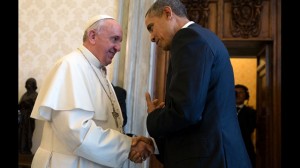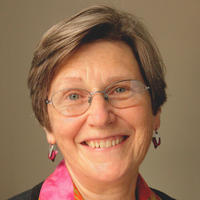
President Barack Obama bids farewell to Pope Francis following an audience at the Vatican, March 27, 2014. (Official White House Photo by Pete Souza)
For me, working in the world of US politics can sometimes be a rough slog of compromise, messaging debates, struggle and outright failure. But then there are moments like March 27, 2014, when President Obama met with Pope Francis in the Vatican.
From all appearances the two enjoyed their conversation and explored thoughts and opportunities. It was nourishment to my spirit to see their smiles. But some have asked, “What did it accomplish?”
While we won’t know the result of any single action, I see hints of good steps forward. First, it seems that Pope Francis’ commitment to those who are left out of the global economy lifted the conversation from rule-bound fear to sharing a vision of something new. Pope Francis speaks of this change candidly, saying that we need to create an economy of inclusion. This economy would put people (not profits) at the center of decision-making. This candid Gospel-based vision seemed to nourish our president. But it is challenging in a country that is so obsessed with the “bottom line” that the Congress fears raising the minimum wage so that people who work full time do not end up still living in poverty.
Finally, I believe that Pope Francis’s care for all helps him to articulate the reality that hungry people see alternatives. Hungry people see global television. Hungry people see opportunity in global communications, and the rich of the world have a responsibility to respond, not in charity, but in justice. Our faith tells us that our world was created to be responsibly shared by all. The pope’s loving challenge to President Obama was not about the nuts and bolts of our political machinations in the United States. Rather, it was in the broader vision of creating a global economy where all are included in opportunity and where the earth is protected in the process.


